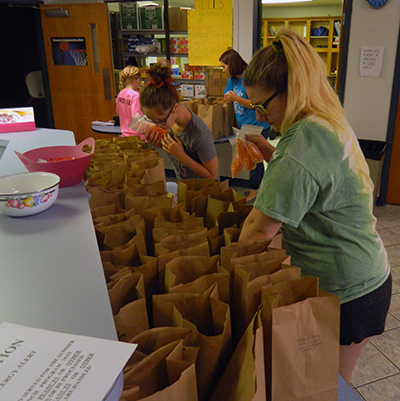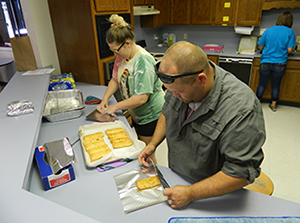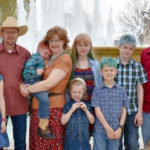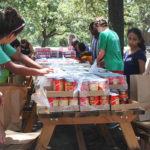QUANAH—Children don’t understand grown-up problems like unemployment, economic downturns and financial setbacks, but they know when they are hungry.
Four years ago, members of First Baptist Church in Quanah recognized children in their community who depended on free or reduced lunches during the school year lacked food in the summer. They saw a need their congregation could help meet by developing a summer sack lunch program.
Concern for children in the community
“It began with concern about the children of our community,” said Dewain Phipps, a deacon at First Baptist, who ran the local housing authority 25 years and understood the plight of underprivileged families in Quanah.
The northwest Texas town’s population peaked at more than 4,600 in the 1950s, and oilfields discovered southwest of town led to relatively prosperous times in the early 1960s. However, the local economy—largely dependent on agriculture—suffered in the decades that followed, and Quanah has fewer than 2,400 residents today.
Storefronts that once lined Highway 6 stand vacant. A gypsum plant that produces wallboard offers the only nearby industrial employment. Some residents seek jobs at correctional units in Childress. Others work as day laborers. The town’s unemployment rate is about twice the national average.
“That can lead to hopelessness and despondency on the part of parents,” Pastor David Smith said. “Some give up, turn to drugs and fall victim to substance abuse.”
Summer sack lunches
In the process, children suffer, and members of First Baptist realized schoolchildren lacked access to meals in the summer. So, they began preparing and distributing sack lunches five days a week to any child or teenager in the community, upon request.
Sign up for our weekly edition and get all our headlines in your inbox on Thursdays
 Ashlynn Majors and Ashley Ensey stuff sacks with lunch items before volunteers from First Baptist Church in Quanah distribute them to children in their community. (Photo / Ken Camp)The church promotes the program through the local schools each May, and it advertises on an electronic sign in front of the church campus.
Ashlynn Majors and Ashley Ensey stuff sacks with lunch items before volunteers from First Baptist Church in Quanah distribute them to children in their community. (Photo / Ken Camp)The church promotes the program through the local schools each May, and it advertises on an electronic sign in front of the church campus.
Every sack lunch includes one hot entrée, such as chicken nuggets, a burrito or macaroni and cheese, along with a snack, such as a fruit cup or string cheese and a bottle of water—no candy.
The program follows a “kid-friendly” menu, Smith noted.
“We want it to be healthy, but we also want it to be consumed,” he said.
In 2016, the church served 4,500 meals. This year, volunteers expected to top the 5,000-meal mark.
Worthwhile investment
The ministry costs between $7,000 and $8,000 a year, and the church accepts no government funds. It has received some support from the Baptist General Convention of Texas, provided in part by the Texas Baptist Hunger Offering, and it has benefited from some local fraternal organizations.
 Ashley Ensey and Josh Majors wrap “hot pockets” in foil before placing them in sack lunches First Baptist Church in Quanah will distribute to children and teenagers. (Photo / Ken Camp)Otherwise, the congregation funds the summer sack lunch program.
Ashley Ensey and Josh Majors wrap “hot pockets” in foil before placing them in sack lunches First Baptist Church in Quanah will distribute to children and teenagers. (Photo / Ken Camp)Otherwise, the congregation funds the summer sack lunch program.
“God always provides,” Phipps said.
First Baptist averages about 120 in attendance on Sunday. Over the course of the summer, the sack lunch ministry involves up to 75 volunteers.
“If we can afford to do this, just about any church can do it,” said Smith, who grew up in the church and returned to Quanah a few months ago as pastor after a career in Christian higher education, most recently at Dallas Baptist University.
‘You’re the lady with the lunches’
Some volunteers arrive each day before 10 a.m. to begin packing lunches. Some begin making home deliveries about 11:30 a.m. Others prepare to serve the children who line up at the door to the church’s family life center at noon.
Nell Looper has delivered meals nearly every day since the ministry began. As a retired schoolteacher who now works afternoons at the city library, she recognized the need for the ministry.
“I know there are children who come to school hungry,” she said.
Through the daily deliveries in the summertime, she has established relationships with children and their families.
“It’s a real blessing,” she said. “When they see me at the library or around town, they know me. They say, ‘You’re the lady with the lunches.’”
In addition to working with the summer sack lunch ministry, Looper and another volunteer at First Baptist, Dorothy Morse, also lead the congregation’s Kids’ Connection—a program that enables children in poverty to begin each school year with a new winter coat, clothing, shoes and school supplies.
“It just needed to be done,” Morse said.
Volunteers see their community in a new way
Volunteers Ridley Gibson and Norman Rockholt both acknowledged they did not fully understand the living conditions of some children in their town until they began delivering sack lunches to homes.
“I got my eyes opened,” Gibson said. “There are kids who are really hungry. It’s a blessing to bring a little sunshine into a dark place.”
Rockholt noted he was “shocked” when he saw the desperate situations facing some children in his community.
“I knew there was a need, but I didn’t realize this was needed,” he said. “Once I saw it, I said, ‘We’ve just got to do it.’”
Susan Gibson helps keep the summer sack lunch ministry stocked with groceries. She and others purchase locally what they can at a reasonable price, and they travel every two weeks to a retail warehouse in Wichita Falls, 80 miles away, to buy the rest.
“I don’t work with kids much, but I can do this,” she said.
One volunteer recalled an incident during an evening Vacation Bible School when church members were serving food to children. A girl who had received a sack lunch earlier in the day declined the meal she was offered.
“No,” she said. “I ate at noon.”
“Well, this week, you get to eat twice a day,” the volunteer told her.
Church embraces children
Laypeople at First Baptist initiated the summer sack lunch ministry, and they continued it through times of pastoral transition, Smith noted.
“It’s the people’s ministry—the people of the church,” he said. “I’m just their cheerleader.”
Some children who participate in the summer sack lunch program have started attending Sunday morning Bible study and worship, and a larger number participate in Wednesday evening activities, he said.
“Our church embraces them and loves on them,” Smith said.
While the summer sack lunch program represents a significant commitment of time, energy and financial resources, the congregation strongly supports it, he added.
“Who wouldn’t want to be involved in feeding hungry children?” he asked.
This is part of an ongoing series about how Christians respond to hunger and poverty. Substantive coverage of significant issues facing Texas Baptists is made possible in part by a grant from the Prichard Family Foundation.
Read more articles like this in CommonCall magazine. CommonCall explores issues important to Christians and features inspiring stories about disciples of Jesus living out their faith. An annual subscription is only $24 and comes with two complementary subscriptions to the Baptist Standard. To subscribe to CommonCall, click here.
















We seek to connect God’s story and God’s people around the world. To learn more about God’s story, click here.
Send comments and feedback to Eric Black, our editor. For comments to be published, please specify “letter to the editor.” Maximum length for publication is 300 words.